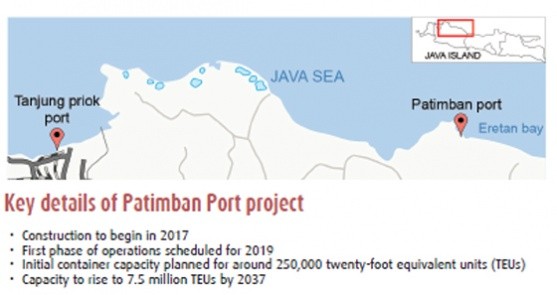Popular Reads
Top Results
Can't find what you're looking for?
View all search resultsPopular Reads
Top Results
Can't find what you're looking for?
View all search resultsNo delay in Japan, RI key projects
Change text size
Gift Premium Articles
to Anyone
D
espite a four-month delay in the construction of the US$3 billion Patimban Port, the country is determined to begin operating it in the first quarter of 2019 as scheduled.
The Transportation Ministry looks to begin the development of what is set to become the country’s new logistics base in January next year, a deadline that some worry might not be met because of current delays in the bidding process.
However, the ministry’s secretary general, Sugihardjo, assured that like its partner Japan, Indonesia wanted to conclude negotiations in March 2019. His statement came after his recent participation in a meeting in Tokyo involving transportation officials of the two countries.
“There have been delays because the bidding process just started,” he said, referring to the first phase of development, which comprises the construction of a car terminal and a container terminal.
“So, the contract will likely be concluded in March [next year] instead of January [next year].”
The project to turn a quiet area in Subang regency, West Java, into a busy international port much like Indonesia’s main gate, Tanjung Priok Port in Jakarta, has been hindered by several issues, from the lengthy process of securing location permits from the regional administration to the slow speed in which the local team in charge of project supervision operates.
Sugihardjo said the government was taking all the necessary steps to expedite the project, including by recently holding a tender for the construction of a road leading to the port.
Land procurement is also expected to finish in February next year.
The project will require 570 hectares of land, the acquisition of which will be funded using the state budget and cost Rp 500 billion (US$37 million).
Patimban Port will be located about 70 kilometers from the Karawang Industrial Estate and Bekasi in West Java, where many Japanese industrial firms, particularly automotive and electronics manufacturers, operate.
Indonesia hopes the port will help it jack up its automotive exports by 30 percent once it becomes operational.
It will have the capacity to handle 1.5 million 20-foot equivalent units (TEUs) of containers once it is partly complete in 2019 and 7.5 million TEUs by 2027.
The project will be funded mostly by the Japan International Cooperation Agency (JICA) for a reported $1.03 billion in the first phase.
Speaking on the current preparation progress, deputy chief of mission at the Japanese Embassy in Indonesia, Kozo Honsei, said that Japan was in the final stage of concluding negotiations with Indonesia over a loan agreement for the project.
“We would like to realize it as soon as possible,” he said.
The Patimban Port project is one of several flagship projects between Indonesia and Japan, a long-time investor that now intensively seeks a tighter grip on infrastructure in Southeast Asia’s largest economy.
Other projects include the development of the MRT system and the revitalization of the Jakarta-Surabaya railway, which will reduce travel time between Java’s main cities by nearly half to only five hours.
Indonesia offered the railway project to Japan after the former disappointed the latter by granting another high-speed railway project, which links Jakarta and West Java’s capital Bandung and is estimated to cost more than $5.5 billion, to China.
JICA and the Agency for the Assessment and Application of Technology (BPPT) are carrying out two separate studies on the design of the Jakarta-Surabaya railway.
Sugihardjo said that both JICA and BPPT would present their studies, including the estimated costs of each design, on Monday and that, later, the government would evaluate the costs in terms of performance.
“We will decide on the [design] at least two weeks [from Monday] or what the fastest [design is], two days from then,” he said.
The government is currently mulling whether to build a new track or build over the existing route.
Transportation Minister Budi Karya Sumadi said recently that the government would likely use the existing route, which costs an estimated Rp 62 trillion, as opposed to building a new track, which costs an estimated Rp 100 trillion.










